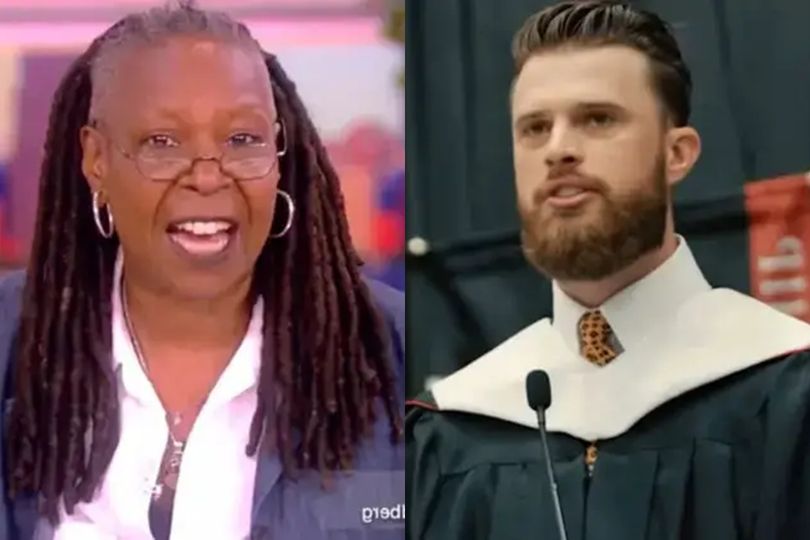In a striking display of outspoken criticism, Whoopi Goldberg, a prominent television personality and co-host of “The View,” has made headlines by urging the Kansas City Chiefs to immediately dismiss their kicker, Harrison Butker.
Her call for action comes in the wake of controversial comments made by Butker during a public appearance, which Goldberg and others have deemed inappropriate and unbecoming of a professional athlete.
This bold statement by Goldberg has not only intensified the ongoing debate surrounding Butker’s remarks but also highlighted the influential role that celebrities can play in shaping public opinion on matters involving professional sports.
Harrison Butker recently delivered a speech that sparked significant controversy due to its content, which some listeners found to be sharply at odds with contemporary social values.
In his address, Butker criticized various aspects of modern culture, including political correctness and certain progressive social movements, which he claimed are detrimental to society’s moral fabric. His comments, particularly those about gender roles and family structures, have ignited a fierce debate across various media platforms.

Whoopi Goldberg, known for her no-nonsense approach on “The View,” did not hold back in her criticism of Butker. During a segment of the show, she argued that someone with such views should not represent a professional sports team, as it sends a conflicting message about the values the organization stands for. Goldberg stated, “If the Chiefs are about integrity, inclusiveness, and respect, then keeping Butker on the team contradicts all of that. Ban him from the team right away.”
Goldberg’s comments have reignited discussions about the extent to which celebrities should involve themselves in sports-related issues. As public figures with significant influence, celebrities like Goldberg can amplify certain viewpoints, potentially swaying public opinion and pressuring organizations to act. However, this also raises questions about the fairness of subjecting athletes to potentially career-ending scrutiny based on their personal beliefs.
The reaction to Goldberg’s call for Butker’s dismissal has been mixed. Supporters praise her for taking a stand on what they agree are outdated and harmful ideologies being promoted by a public figure. Critics, however, argue that Goldberg’s demand infringes on Butker’s freedom of speech and that his personal views, as long as they do not violate any laws or league policies, should not impact his professional career.
The Kansas City Chiefs find themselves in a precarious situation. On one hand, they must consider the values they want to uphold as an organization and the diverse perspectives of their fan base. On the other, they need to manage the potential backlash from taking action against Butker, which could be seen as a violation of his personal rights. The decision is further complicated by the attention and pressure from high-profile figures like Goldberg.
The debate also touches on legal and ethical realms, questioning the balance between an employer’s right to protect its image and an employee’s right to free expression. Sports teams, while private entities capable of imposing their own codes of conduct, must also navigate the complex interplay between public expectations and legal boundaries regarding freedom of speech.
















